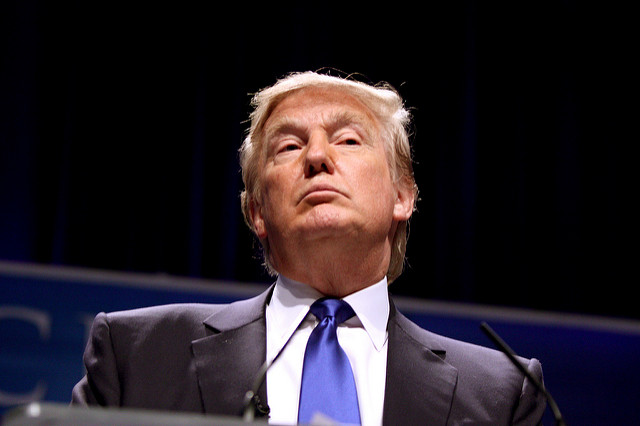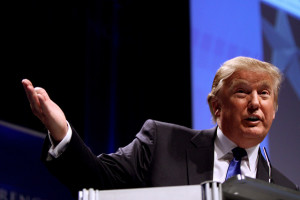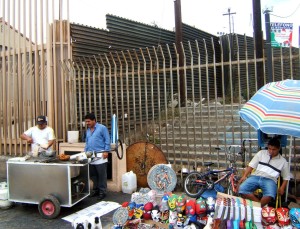Trump’s Wall: A Divide in US-Mexico Relations

President Trump is gearing up to follow through on his campaign promise to strengthen border security and cut down illegal immigration by building a wall between Mexico and the United States. The wall’s purpose would be to attempt to lower illegal immigration across the US-Mexico border and serve as a physical representation of President Trump’s disapproval of US companies’ offshoring their manufacturing to Mexico. The proposed wall has quickly become a diplomatic divide, souring US-Mexico relations.
One of the primary points of contention around the wall’s construction is the question of who is going to fund it. Various news outlets and contractors have estimated the cost of the wall somewhere between 12 and 25 billion dollars. While President Trump has famously claimed that Mexico “will reimburse us for the cost of the wall”, Mexico’s president Enrique Peña Nieto responded by saying “It is evident that we have differences with the new United States government on some issues, such as a wall that Mexico absolutely will not pay for.” It is more likely that President Trump will attempt to get funding through the appropriations process, and later ask for Mexico to reimburse the US for the cost of the wall. If the funding for the wall goes through congressional channels, it means that US tax-payers will have to bear the entire cost of building the wall.

Credits: https://flic.kr/p/9hNwi1
When asked how the US will force Mexico to pay for the wall, New York Rep. Chris Collins stated, “When you understand that Mexico’s economy is dependent upon US consumers, Donald Trump has all the cards he needs to play.” The wall has quickly become a tool to twist the economic dependency that Mexico has towards the US. Yet, many forget that it is not a one-way street, and that Mexico plays a huge part in the economic growth of the US. Rep. Filemon Vela, D-Texas commented, “Mexico is an ally, not an enemy. It is our second-largest trading partner, and building a wall between two countries with such important ties is a senseless and wasteful exercise.” While tensions over trade have manifested into a physical divide between the two countries, their strategic partnership cannot be ignored when considering the impact of building a wall.
Compounding tensions over the proposed wall is President Trump’s condemnation of automakers for offshoring jobs, which previously were located in the American Mid-west to factories in Mexico. President Trump took to twitter to instill fear into US automaker General Motors for importing cars it makes in Mexico. President Trump tweeted, “General Motors is sending Mexican made model of Chevy Cruze to U.S. car dealers-tax free across border. Make in U.S.A. or pay big border tax!” A tweet which some noticed was rather odd considering President Trump had recently appointed Mary Barra, General Motor’s CEO, to his strategic and policy forum. Under the North American Free Trade Agreement (NAFTA), all goods made in Mexico can be imported to the US at no cost. President Trump’s threat of creating an import tariff on items made in Mexico would go against principles of NAFTA. Ironically, Canada, who is also part of NAFTA, has had more trade complaints brought against it for raising tariffs against US imports than Mexico has. In response to President Trump’s tweet Ford Motors announced that it was canceling its plans to build a 1.6 billion dollar plant in San Luis Potosi, Mexico and instead would build a 700 million dollar plant in Michigan. This turn of events will set investors in San Luis Potosi back millions, as they had already begun selling the land and buying materials in preparation for building the plant.

Credits: http://bit.ly/2jq7P0t
While President Trump may be trying to bring back offshored jobs, the majority of economists will argue that free trade is good because it allows for countries to specialize in the production of certain goods and leads to more goods being produced. While Mexico may not be more efficient at producing automobiles, it can produce them at a comparatively lower opportunity cost than the United States. This means that free trade results in a net gain of goods for both countries, and allows them to consume beyond what they could ordinarily make absent trade. While President Trump seems to be suggesting a switch to protectionist legislation, Mexico is also condemning President Trump’s economic attack. President Peña Nieto responded by stating that he will continue to pursue a free trade policy.
While a wall certainly sends a message, it does little to update immigration reform or retrain workers who previously worked in the automobile industry in order for them to get new jobs in new sectors of the economy. More specifically, “It’s a 14th century solution to a 21st century problem,” Texas Democratic Rep. Henry Cuellar commented. The wall merely embodies a divide between the two nations and the unwillingness that President Trump displays at resolving the root cause of many of the nations greatest issues. Whether the wall goes up or not, it is vital to keep in mind the strategic partnership of the two nations, and the importance of compromise.
